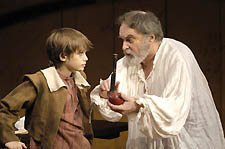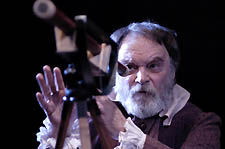Star Power
The Life of Galileo at Studio Theatre, All's Well That Ends Well at Folger Theatre
Anyone who is readily familiar with the controversial astronomer Galileo Galilei and his denounced teachings will no doubt find interest in David Hare’s compelling translation of Bertolt Brecht’s The Life of Galileo. Brecht’s historical dramatization of Galileo’s seventeenth-century trials is enough to intrigue any historian, mathematician, scientist, or philosopher. The interesting thing about the new Studio production, however, is that everyone should be interested in Hare’s brilliant drama, performed with acute skill and with marvelous direction from British transplant David Salter. Hare has cleverly adapted Brecht’s original story into an excellent translation with bright, witty dialogue and a uniquely human bend.
 Mastering the Universe: Vance and van Griethuysen (Photo by Scott Suchman) |
Following the invention of the telescope (which Galileo successfully pawned off as his own) and the realities of Copernicus’ dark fate for peddling scientific truths, Galileo was seen by the Catholic Church as a sort of anti-hero, a man willing to recant his “beautiful hypothesis ” in order to save himself from an untimely and torturous death. It wasn’t until the mid-1990s that Galileo was finally pardoned by the church.
In the Brecht-Hare script, the ages-old argument of religion versus science is finally brought to life with long, deep breaths that inhale questions of philosophy and history and exhale answers with reason and logic. Here Galileo is not illustrated as a staunch scientist with a strict agenda so much as a distinctly human man, a father and teacher with carnal desires (“I’m in grave need of luxury, ” he confides in his audience) and a penchant for seeking the truth about the grand designs of the universe (“There is no virtue in ignorance “). It’s a bear of a role, and Washington favorite Ted van Griethuysen is up to the task of putting a human face on Galileo, reprising his 2002 London turn as the prolific genius.
 |
The savvy production opens up with us looking in on a scene with Galileo and a young pupil. Salter’s scenes don’t really unfold in the style of typical American theatre with an air of self-awareness and contrition. Instead, they make no acknowledgement of an audience, and do so without apology. It’s really quite a gift, and we get to watch Galileo as though idly witnessing history unfold before us. Realism is an essential element for Salter’s cast and they glide along that delicate balance with great agility.
Van Griethuysen is master of his role: like the planets and the sun, the play revolves around him, and he knows it. There is a sense of suave familiarity in his walk, something even sensual about van Griethuysen’s astronomer, something very tangible about his humanity. But van Griethuysen doesn’t bother acting: he presents his character as though he and the ol’ Italian scientist go “way back, ” and he is just mimicking a close friend. There are no airs or assumptions in his portrayal: van Griethuysen simply is Galileo.
|
The rest of Salter’s cast is almost as memorable. Karl Miller still displays formidable acting chops as one of the most talented young actors in the area, and Lawrence Redmond always makes the most of his smaller roles, but the real gems of Salter’s crew are two impressive talents from the unlikely trenches of the sixth grade: Peter Vance as the young Andrea Sarti and Christopher Luggiero as the Grand Duke of Rome. Both effortlessly manage to steal every scene they are in.
Designer Helen Q. Huang has crafted a set and costumes that are exquisitely detailed with the eye of lengthy period research, and Michael Giannitti’s lighting and Peter Weitz’s original score are also perfectly appropriate as well.
To quote Indigo Girls Amy Ray and Emily Saliers, “Galileo’s head was on the block/the crime was looking up the truth. ” The truth here is that with van Griethuysen in such a larger-than-life role and with Salter at the helm, The Life of Galileo may just give birth to a promising new life of its own. We’ll see if it’s in the stars.
Stars, stars, stars. The Folger Theatre is full of ’em this season. In their season opener alone, Shakespeare’s All’s Well that Ends Well, they boast a roster of some of the finest performers in the area: Holly Twyford, Catherine Flye, Naomi Jacobson, Rich Foucheux, and Rick Hammerly, to name a few. With an all-star line-up like that, how could the play be any less than heavenly? It’s a rather serious question when you present such an utterly disappointing production.
|
Certainly Shakespeare meant to be controversial when he wrote his steadfast “heroine ” Helena. After she is rejected by her prime choice of French noblemen, Helena asserts a rather deplorable plot to win the heart of her betrothed. Her elaborate scheme succeeds, and in the efforts of glorifying the title of the play, her enlightened husband sees the error of his ways and eventually comes to love his virtuous, loyal wife.
Victims of bruxism beware: Richard Clifford’s production is slow, melodramatic, and makes a choice case for those who claim they can’t understand Shakespearean drama. Yes, the actors sparkle when they are “supposed to be ” emotional, but other than a few terse blocking calls, one wonders where the director was for this production? The scenes are dreadfully static, the actors either under- or over-rehearsed (it’s difficult to tell with Shakespeare), and the overall stage climate is entirely lifeless.
The only bright spot in the evening is the inimitable Suzanne Richard as the Fool. Richard is like a blinding beam of sunshine in an otherwise dark and dreary cloud. Flye is lovely as usual, and Twyford navigates through the material with her signature sharp tongue, but missing from these two fine actresses is a level of trust in the material that should have been borne out of equally-matched direction.
It’s a shame that with such a brilliant company of stars Clifford’s production proves so unworthy.
Support Metro Weekly’s Journalism
These are challenging times for news organizations. And yet it’s crucial we stay active and provide vital resources and information to both our local readers and the world. So won’t you please take a moment and consider supporting Metro Weekly with a membership? For as little as $5 a month, you can help ensure Metro Weekly magazine and MetroWeekly.com remain free, viable resources as we provide the best, most diverse, culturally-resonant LGBTQ coverage in both the D.C. region and around the world. Memberships come with exclusive perks and discounts, your own personal digital delivery of each week’s magazine (and an archive), access to our Member's Lounge when it launches this fall, and exclusive members-only items like Metro Weekly Membership Mugs and Tote Bags! Check out all our membership levels here and please join us today!

























